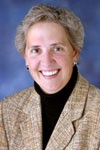The UA’s nearly year-long search for a new provost is over.
Meredith Hay, vice president for research at the University of Iowa, has been chosen by President Robert Shelton as the UA’s next provost and executive vice president.
Her appointment is pending approval by the Arizona Board of Regents during its March 6-7 meetings.
If approved, Hay will begin April 30. She would replace Eugene Sander, who has served as provost since George Davis retired in June.
Hay could not be reached for comment over the weekend.
“”I am truly honored to be invited to join the University of Arizona family,”” Hay said in a UA press release. “”The UA is one of the very best universities in the country – its commitment to student-centered excellence, its work and outreach to improve the lives and well being of the citizens of Arizona and the world, its bold and world-renowned research ranging from plant genetics to planetary exploration are all very exciting.
“”I look forward to meeting and working with the Tucson and Arizona communities as well as the faculty, students and staff to continue to advance and celebrate the excellence that defines the UA.””
Hay would oversee all of the university’s academic programs and units, and serve as the UA’s chief academic officer.
She would also receive a tenured appointment as a professor of physiology in the College of Medicine.
Hay was one of 60 candidates for the position. Shelton formed a 27-member search committee in April, chaired by Vicky Chandler, director of the BIO5 Institute and plant sciences professor.
Hay visited the UA to speak at an open public forum Jan. 29, when she expressed a vision of making Arizona one of the top 10 public research institutions in the country.
Hay has an extensive background in research and is currently leading a laboratory at Iowa funded by the National Institutes of Health.
She has received international recognition for her work in the field of cardiovascular neurobiology and is in the midst of studies on hypertension and the roles sex and sex differences play in its development.
She is a member of the American Physiological Society, the Society for Neuroscience and the American Association for the Advancement of Science. She also serves on advisory committees for NASA, National Institutes of Health and the Association of American Universities.
– The Arizona Daily Wildcat









